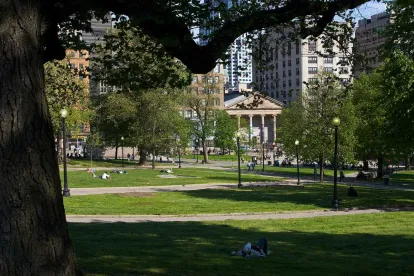The City of Boston is advancing three companion regulatory efforts to reduce greenhouse gas emissions for medium-sized and large buildings. As addressed in our 2021 advisory, the Boston Emissions Reduction and Disclosure Ordinance (BERDO 2.0) requires zero net carbon emissions by 2050 for existing buildings of at least 20,000 square feet. Proposed changes to Article 37 of the Boston Zoning Code would require zero net carbon emissions for the same size buildings at opening. Further, Boston is expected to adopt a building code option (Specialized Code) that narrows the energy compliance pathways to achieve a building permit.
BERDO 2.0 Regulations
The Air Pollution Control Commission (APCC), which administers BERDO 2.0, adopted Phase 1 regulations in March, 2022, instituting reporting and data verification requirements. A building owner may designate a tenant as the “owner” for compliance purposes for a lease of at least thirty years, including renewal options. Otherwise, the owner is responsible for reporting energy usage and must document taking reasonable steps to collect tenant data. Emissions targets reported annually to APCC may be blended based on the gross floor area of each primary use (according to a calculation method provided in the regulations) if more than one use occupies at least 10% of the building’s floor area, or accounts for more than 10% of the building’s energy use or greenhouse gas emissions.
After receiving substantial public comment, APCC divided Phase 2 regulations into Phase 2a, adopted on December 14, 2022, and Phase 2b, adopted on January 25, 2023. The Phase 2a regulations address ownership changes and designations, blended emissions standards, and the Review Board that will be tasked with reviewing proposed building portfolios, approving hardship compliance plans, and overseeing enforcement, among other responsibilities. In addition to a City Council seat, Mayor Wu will appoint six members from community-based organizations and two members of the public with expertise in areas listed in the regulations. Within 90 days of the Review Board being seated, the APCC intends to convene working groups for healthcare institutions and commercial real estate to recommend BERDO regulations changes or sector-specific criteria for hardship compliance plans.
The Phase 2b regulations address renewable energy certificates, power purchase agreements, local renewable generation, and emissions factors by fuel type used for calculating compliance with BERDO 2.0 emission standards. The forthcoming Phase 3 regulations will focus on building portfolios, individual compliance schedules, hardship compliance plans, alternative compliance payments, and fees and enforcement.
Article 37 Amendment
Article 37 requires development projects subject to Large Project Review to submit a checklist detailing how the project will meet a Leadership in Energy and Environmental Design (LEED) certifiable standard. In 2022, the Boston Planning & Development Agency (BPDA) released a draft amendment that would (i) lower the green building review threshold from 50,000 square feet to 20,000 square feet, mirroring the BERDO 2.0 applicability threshold; (ii) raise the minimum LEED score from Certified (40+ points) to Gold (60+ points); and (iii) require covered projects to achieve zero net carbon emissions at opening instead of by 2050. Consistent with BERDO 2.0 compliance, “zero net” takes into account greenhouse gas emissions from building operations, avoided emissions from renewable electricity produced on-site or purchased off-site, and any alternative compliance payments.
BPDA is currently refining the draft amendment to reflect public feedback and align with the Stretch Code (addressed below), with a further revised draft to be issued in the coming weeks. The draft amendment would not apply to any proposed project that has received Article 80, Development Impact Project, or Planned Development Area approval by BPDA prior to the first notice of the Zoning Commission public hearing on the final Article 37 zoning amendment. Proposed projects that have applied for but not yet received zoning relief from the Board of Appeal could also be exempt.
Massachusetts Stretch Code and Specialized Code
The Stretch Code, adopted by the City of Boston and most other municipalities, sets energy efficiency requirements for new residential and commercial construction stricter than the Massachusetts Base Energy Code. On December 23, 2022, the Department of Energy Resources (DOER) released an update to the Stretch Code, which automatically became the applicable code in the City of Boston.
Residential Stretch Code updates already apply to building permit applications for one- and two-family dwellings, as well as buildings with multiple dwelling units up to three stories. Starting July 1, 2023, Commercial Stretch Code updates will apply to applications for all other buildings, including any (i) additions greater than 20,000 square feet (below which the Base Energy Code applies), (ii) alterations that require a building permit, and (iii) changes of use that would result in an increase in demand for either fossil fuel or electrical energy. The updates address electrification, air leakage, wiring for electric vehicle charging, and other matters.
On December 23, 2022, the DOER also released the Specialized Code, which municipalities may adopt by city council or town meeting vote, to narrow compliance pathways beyond the Stretch Code based on heightened efficiency and renewable energy from on-site power production. The Specialized Code requires multifamily buildings to achieve precertification to Passive House standards. DOER recommends that municipalities adopting the Specialized Code provide at least a six-month transition for new building permit applications. Boston is expected to adopt the Specialized Code.





 />i
/>i

